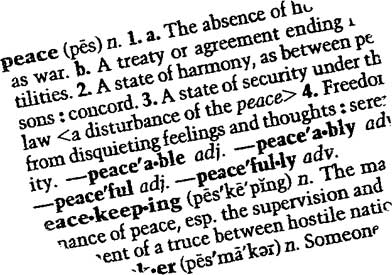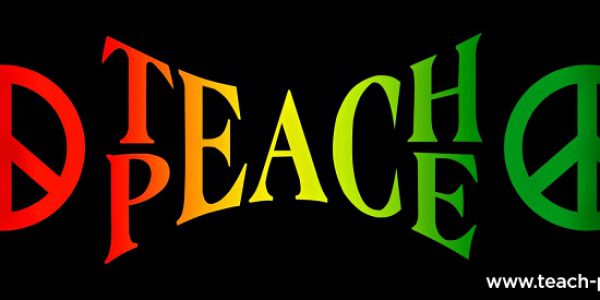
“Peace is not the absence of conflict, it is the ability to handle conflict by peaceable means.” – Ronald Reagan
There are almost as many definitions of peace as there are people in the world. The meaning of peace varies due to cultural differences, spiritual beliefs, and social influences. These three, however, are only a few sources of persuasion that affect individual and collection definitions of peace.
 This first blog focuses on defining peace (as much as possible.) One important takeaway is to begin to see the meaning of peace through the eyes of others, and to learn about and acknowledge reasons for the variations.
This first blog focuses on defining peace (as much as possible.) One important takeaway is to begin to see the meaning of peace through the eyes of others, and to learn about and acknowledge reasons for the variations.
Another key element in defining peace is self-reflection to see how you perceive and define peace. Remember that each definition is valid to the person giving the definition. World peace begins by not judging others for their personal understanding of peace.
Inner peace is the starting point on an ultimate journey to world peace. The process has to start somewhere.
QUESTION and PERSONAL REFLECTION: Does it make sense to personally understand peace before reaching out to understand the definitions of others?
It’s been suggested that authentic truth is spoken through the mouths of babes. Children from various educational institutions across the country were asked to define peace. Here are two beautiful (and short) examples of how little ones view peace.
(Personally, I could sit and watch kid videos all day!)
In the Bible, it says to whom much is given, much is expected (Luke 12:48). In his short life, Beatle John Lennon spread a consistent message of peace, love, and harmony.
“Imagine there’s no countries. It isn’t hard to do. Nothing to kill or die for. No religion, too… imagine all the people… living for today…” – John Lennon
Many define peace as the absence of war.  Others define it as a state of harmony between people, where there are no feelings or thoughts of disquiet, or distrust, because they have no need to exist. Manmade laws, such as treaties, attempt to protect citizens from the wages of war. The ultimate negotiation, however, will be among the people themselves because they will see how beneficial living is peace is. It will become a normal behavior, rather then an exception.
Others define it as a state of harmony between people, where there are no feelings or thoughts of disquiet, or distrust, because they have no need to exist. Manmade laws, such as treaties, attempt to protect citizens from the wages of war. The ultimate negotiation, however, will be among the people themselves because they will see how beneficial living is peace is. It will become a normal behavior, rather then an exception.
Personally, my definition up to this point in time, resulting from several years of research, is this:
“Life is a state of living as human beings, where differences and diversity naturally exist, where peace is a choice. Ultimately, people will learn to negotiate their differences while celebrating their diversities. Peace is not a behavior that comes naturally, but is a learned behavior. Whether people are born good or bad is irrelevant. What matters is that we each consciously make the decision to get along peaceably by honoring how others understand and define their lives and cultures, as they likewise honor how we understand and define our own. No one is better but no one is worse than anyone else. We all exist to help and learn from one another. The earth and its resources are there for all humankind, to be shared and replenished by all who use them. Each person takes responsibility for his or her own actions, apologizing and correcting actions or spoken words when wrong, likewise humbly accepting the apologies of those who do others wrong.” – Cathy Lee Gaskill Mullett (2018)
Every major religion and life philosophy should strive to co-exist peacefully with all who subscribe to other religions or life philosophies. Violence often begins by fearing what is not understood or different than what someone is used to. Violent behavior can be a result of judging others without listening to and then considering both sides of a situation.
Reciprocity: A Golden Rule Way of Living
From the Religious Tolerance website:
- Ancient Egyptian: Do for one who may do for you, that you may cause him thus to do. The Tale of the Eloquent Peasant, 109-110 (Translated by R. B. Parkinson. Original dates to 1800 BCE, and may be the earliest version of the topic of reciprocity ever written.)
- Bahá’í Faith: And if thine eyes be turned towards justice, choose thou for thy neighbor that which you chooses for thyself. Epistle to the Son of the Wolf
- Brahmanism: This is the sum of Dharma (duty): Do naught unto others which would cause you pain if done to you. Mahabharata 5:15:17
- Buddhism: Hurt not others in ways that you yourself would find hurtful. Udana-Varga 5:18
- Christianity: As ye would that men should do to you, do ye also to them likewise. Matthew 7:12
- Confucianism: What I do not wish men to do to me, I also wish not to do to men. Analects 15:23
- Hinduism: This is the sum of duty: do not do to others what would cause pain if done to you. Mahabharata 5:15:17
- Incan Religion: Do not to another what you would not yourself experience. Manco Capoc, founder of the empire of Peru
- Islam: None of you (truly) believes until he wishes for his brother what he wishes for himself. Number 13 of Imam “Al-Nawawi’s Forty Hadiths“
- Judaism: What is hateful to you, do not to your fellow man. This is the law: all the rest of commentary. Talmud, Shabbat 31a
- Native American Spirituality:
- Respect for all life is the foundation. The Great Law of Peace
- All things are our relatives; what we do to everything, we do to ourselves. All is really One. Black Elk
- Do not wrong or hate your neighbor. For it is not he who you wrong, but yourself. Pima proverb
- Roman Pagan Religion: The law imprinted on the hearts of all men is to love the members of society as themselves.
- Satanism: (From the Satanic Temple Seven Tenets)
- Strive to act with compassion and empathy toward all creatures in accordance with reason. Tenet #1
- The freedoms of others should be respected, including the freedom to offend. To willfully and unjustly encroach upon the freedoms of another is to forgo your own. Tenet #4
- Every tenet is a guiding principle designed to inspire nobility in action and thought. The spirit of compassion, wisdom, and justice should always prevail over the written or spoken word. Tenet #7
Note: Some refer to Satanism consisting of non-existent groups. (See link to website)
- Shinto:
- The heart of the person before you is a mirror. See there your own form. Munetada Kurozumi
- Be charitable to all beings, love is the representative of God. Ko-ji-ki Hachiman Kasuga
- Don’t create enmity with anyone as God is within everyone. Guru Arjan Devji 259
- No one is my enemy, none a stranger and everyone is my friend. Guru Arjan Dev : AG 1299
- Sufism: The basis of Sufism is consideration of the hearts and feelings of others. If you haven’t the will to gladden someone’s heart, then at least beware lest you hurt someone’s heart, for on our path, no sin exists but this. Dr. Javad Nurbakhsh, Master of the Nimatullahi Sufi Order.
- Taoism:
- Regard your neighbor’s gain as your gain, and your neighbor’s loss as your own loss. Tai Shang Kan Yin P’ien
- To those who are good to me, I am good; to those who are not good to me, I am also good. Thus all get to be good.
- The sage has no interest of his own, but takes the interests of the people as his own. He is kind to the kind; he is also kind to the unkind: for Virtue is kind. He is faithful to the faithful; he is also faithful to the unfaithful: for Virtue is faithful. Tao Teh Ching, Chapter 49
- Unitarian Universalism (referred to as Unitarianism in some countries):
- The inherent worth and dignity of every person
- Justice, equity and compassion in human relations…
- The goal of world community with peace, liberty, and justice for all
- We affirm and promote respect for the interdependent web of all existence of which we are a part. Unitarian principles
- Wicca: An it harm no one, do what thou wilt (i.e. do what ever you will, as long as it harms nobody, including yourself). Wiccan Rede
- Yoruba (Nigeria): One going to take a pointed stick to pinch a baby bird should first try it on himself to feel how it hurts.
Some historically famous philosophers also declared statements of reciprocity:
- Aristotle: We should behave towards friends, as we would wish friends to behave towards us. (This is a restricted version of the golden rule limited only towards friends. Greece; 4th century BC
- John Stuart Mill: To do as you would be done by, and to love your neighbor as yourself, constitute the ideal perfection of utilitarian morality. Britain; 19th century
- Kant: Act as if the maxim of thy action were to become by thy will a universal law of nature. Germany; 18th century AC
- Plato: May I do to others as I would that they should do unto me. Greece; 4th century
- Socrates: Do not do to others that which would anger you if others did it to you. Greece; 5th century BC
QUESTION and PERSONAL REFLECTION: How do you define peace?















